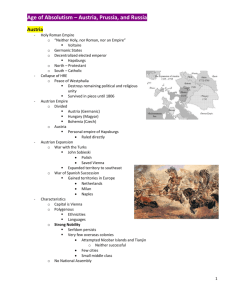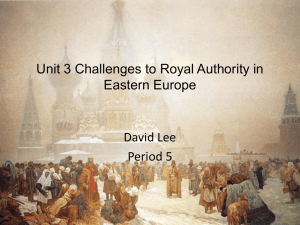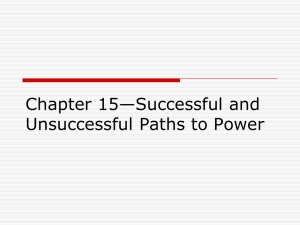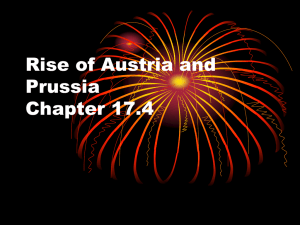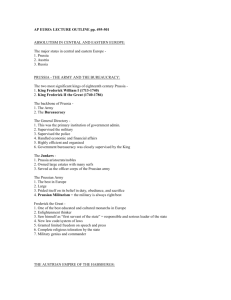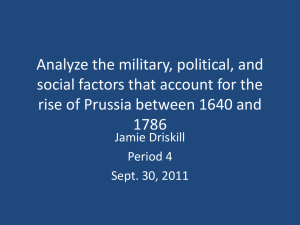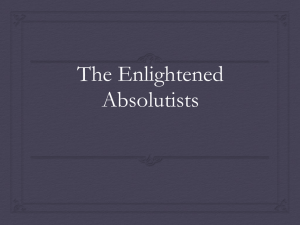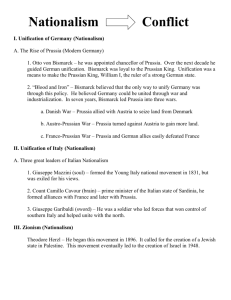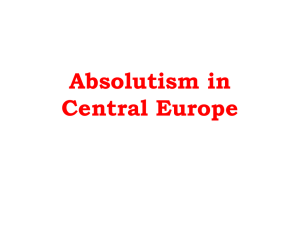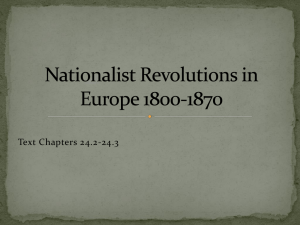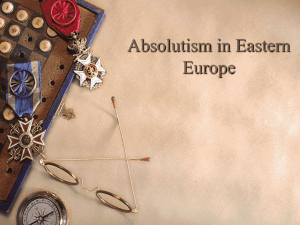Absolutism in Austria and Prussi
advertisement
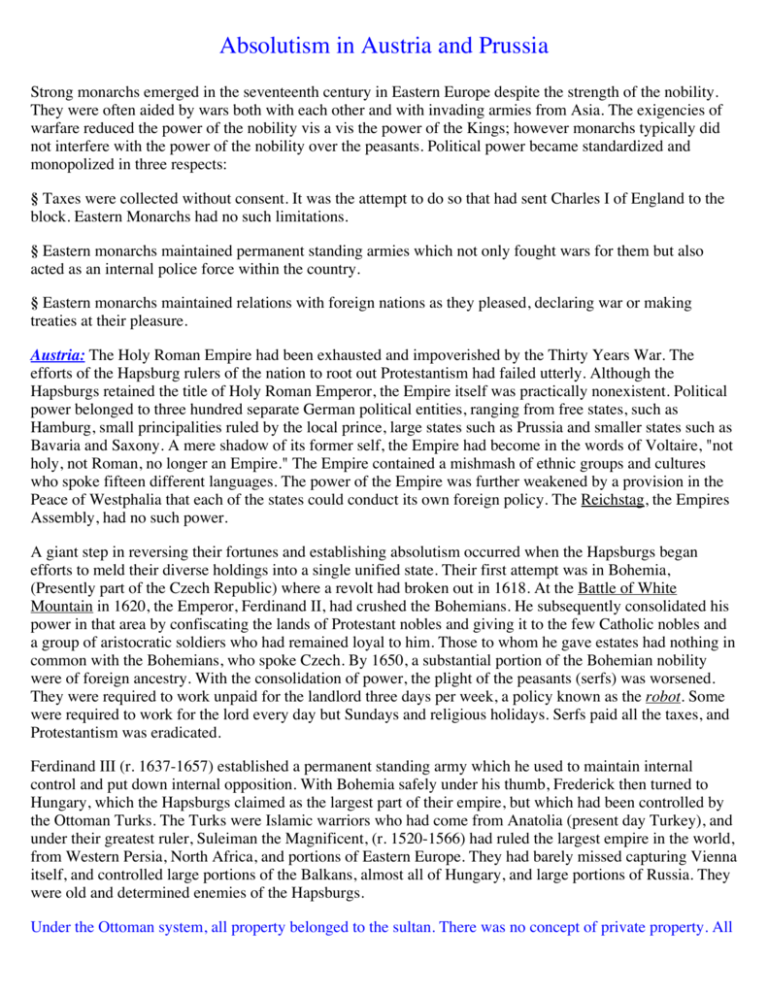
Absolutism in Austria and Prussia Strong monarchs emerged in the seventeenth century in Eastern Europe despite the strength of the nobility. They were often aided by wars both with each other and with invading armies from Asia. The exigencies of warfare reduced the power of the nobility vis a vis the power of the Kings; however monarchs typically did not interfere with the power of the nobility over the peasants. Political power became standardized and monopolized in three respects: § Taxes were collected without consent. It was the attempt to do so that had sent Charles I of England to the block. Eastern Monarchs had no such limitations. § Eastern monarchs maintained permanent standing armies which not only fought wars for them but also acted as an internal police force within the country. § Eastern monarchs maintained relations with foreign nations as they pleased, declaring war or making treaties at their pleasure. Austria: The Holy Roman Empire had been exhausted and impoverished by the Thirty Years War. The efforts of the Hapsburg rulers of the nation to root out Protestantism had failed utterly. Although the Hapsburgs retained the title of Holy Roman Emperor, the Empire itself was practically nonexistent. Political power belonged to three hundred separate German political entities, ranging from free states, such as Hamburg, small principalities ruled by the local prince, large states such as Prussia and smaller states such as Bavaria and Saxony. A mere shadow of its former self, the Empire had become in the words of Voltaire, "not holy, not Roman, no longer an Empire." The Empire contained a mishmash of ethnic groups and cultures who spoke fifteen different languages. The power of the Empire was further weakened by a provision in the Peace of Westphalia that each of the states could conduct its own foreign policy. The Reichstag, the Empires Assembly, had no such power. A giant step in reversing their fortunes and establishing absolutism occurred when the Hapsburgs began efforts to meld their diverse holdings into a single unified state. Their first attempt was in Bohemia, (Presently part of the Czech Republic) where a revolt had broken out in 1618. At the Battle of White Mountain in 1620, the Emperor, Ferdinand II, had crushed the Bohemians. He subsequently consolidated his power in that area by confiscating the lands of Protestant nobles and giving it to the few Catholic nobles and a group of aristocratic soldiers who had remained loyal to him. Those to whom he gave estates had nothing in common with the Bohemians, who spoke Czech. By 1650, a substantial portion of the Bohemian nobility were of foreign ancestry. With the consolidation of power, the plight of the peasants (serfs) was worsened. They were required to work unpaid for the landlord three days per week, a policy known as the robot. Some were required to work for the lord every day but Sundays and religious holidays. Serfs paid all the taxes, and Protestantism was eradicated. Ferdinand III (r. 1637-1657) established a permanent standing army which he used to maintain internal control and put down internal opposition. With Bohemia safely under his thumb, Frederick then turned to Hungary, which the Hapsburgs claimed as the largest part of their empire, but which had been controlled by the Ottoman Turks. The Turks were Islamic warriors who had come from Anatolia (present day Turkey), and under their greatest ruler, Suleiman the Magnificent, (r. 1520-1566) had ruled the largest empire in the world, from Western Persia, North Africa, and portions of Eastern Europe. They had barely missed capturing Vienna itself, and controlled large portions of the Balkans, almost all of Hungary, and large portions of Russia. They were old and determined enemies of the Hapsburgs. Under the Ottoman system, all property belonged to the sultan. There was no concept of private property. All the agricultural land was the sultan’s private estate, and he could use it as he saw fit. There was no hereditary nobility. Each year, the sultan levied a "tax" of one to three thousand male children on the Christian population of the Balkans, who were his personal slaves. They were raised as Muslims in Turkey and trained either as fighters or as administrators. The most talented rose to the top of the government as the Sultan’s personal servants those less fortunate were trained as soldiers who became the Sultan’s private army, the Janissaries. They constituted a formidable fighting force with which the Christian armies of Europe had to reckon. The Muslim system worked well as long as the empire expanded, and more and more children were available to be "taxed away." Loyal Turkish servants were often rewarded by the privilege of taxing Christian peasants, although the amount of the tax was strictly controlled. Although Christians were forced to surrender children for taxation, they were not forced to convert to Islam, and were not as heavily taxed or worked financially as were their counterparts under the Christian Hapsburgs. By 1570, however, the empire ceased to expand. Muslim landowners began to oppress their Christian servants with higher and higher taxes, the army failed to keep up with western military advances, and a line of weak sultans spent more time in the harem than on the battlefield. One hundred years later, the Turks rejuvenated themselves for one last campaign against the Hapsburgs. They did so with the help of a number of Protestant nobles in Hungary and an alliance with Louis XIV of France, the traditional enemy of the Hapsburgs. (Although he claimed to be a devout Catholic, Louis did not let his religion interfere with his political ambitions. The fact that the Hapsburgs were also staunch Catholics was largely irrelevant when it came to territorial warfare.) Pope Innocent XI persuaded the Emperor, Leopold I, (who had been trained for the priesthood before becoming Emperor and considered himself a prince of the Church to lead a "Holy League" against the Turks. The resulting War of the Holy League (1686-1687) was fought mainly in Hungary. The Turks laid siege to Vienna for two months but the siege was broken and the Turkish retreat turned into a rout. The war ended with the Peace of Karlowitz, which ratified Habsburg control of Hungary. As a result of the failed campaign, by 1699 the Hapsburgs had reconquered and controlled almost all of Hungary and Transylvania (present day Romania.) The Hungarian Estates was forced to declare that the Hungarian Throne, known as the Crown of Saint Stephen, would henceforth be a hereditary possession of the Habsburgs. (It had previously been elective.) The Habsburg Monarchs hoped to consolidate their empire into a single unified absolutist state, particularly after their victory over the Turks, but were only partially successful. The Empire was comprised to too many diverse nationalities which had little in common with each other, and who bitterly resented (and resisted) any attempt at consolidation. The Empire was comprised of three distinct territories: the hereditary provinces of Austria, the Kingdom of Bohemia, and the kingdom of Hungary. Their only common element was a common ruler, the Holy Roman Emperor. In 1713, in an attempt to hold the Empire together, had introduced the Pragmatic Sanction which stated that Hapsburg territories were never to be divided and were always to be passed intact to a single heir. Since Charles was the last of the male Hapsburg rulers, it appeared that the next would most likely be a female. His efforts were violently opposed by the Hungarian nobility, which constantly rebelled. They were Protestants, and had been treated tolerantly by the Turks; with the defeat of the Turks, the Habsburgs used rather heavy handed attempts to force Catholicism upon them, which they vigorously resisted. Additionally, they had acquired a nationalist identity long before other parts of the Empire, and had powerful allies in the Turks. Although they never won, they were never decisively defeated, and rose again and again. While the Habsburgs were preoccupied with the War of the Spanish Succession, the Hungarians revolted again under the leadership of one Francis Rákớcsy in 1703. They were defeated, but the Habsburgs were forced to make concessions to them, including the understanding that the Hungarian nobles would retain their traditional privileges in exchange for acceptance of nominal Habsburg rule. Thus, although Bohemia and Austria were ruled by an absolutist centralized Habsburg ruler, Hungary retained some degree of independence, and did not became part of an absolutist empire. Prussia in the Seventeenth Century: The largest and most powerful nobles in the area of Brandenburg and Prussia had been the Hohenzollern family, although they exercised little military power. They were in essence primus inter pares (first among equals) with little princely power other than the dubious right of the elector of Brandenburg to cast a ballot (one of seven) to elect the Holy Roman Empire. The area they controlled was to a large extent a victim of its own geography. Berlin, the largest city in Brandenburg, was cut off from the sea. It also had no natural frontiers and was open to attack from directions. A combination of sand and swamp meant that agricultural production was dismal at best, as a result of which Brandenburg was often called the "sandbox of the Empire." Prussia fared little better. The duke of Prussia was the cousin of the Elector of Brandenburg, but it was really part of Poland. By 1600 the people of Prussia, although German speaking, had more in common with the Poles than with their Brandenburg cousins. Prussia’s fortunes changed as did other parts of Europe with the Thirty Years War. In 1618, the last branch of the Hohenzollern family in Prussia died out, and Prussia reverted to the elector of Brandenburg, also a Hohenzollern. The area was devastated by the Thirty Years War, but it also weakened the authority and power of the Estates, the representative assemblies. The Estates had not met regularly during the Thirty Years War, but still held the power of the purse, as taxes could not be levied without their consent. The major Estates were dominated by the nobility and landowning class, known as Junkers. This was very similar to the situation in England, however the Estates were unable to resist the efforts of their monarch to consolidate power in his own name; otherwise Prussia may have developed into a Constitutional monarchy as existed in England. In 1640, Frederick William, known as the Great Elector, came to power and was determined to unite his realm into a single absolutist state. Frederick and forced the Estates to give him power to levy taxes without their consent. He used the funds from these taxes to maintain a permanent standing army, and used his soldiers at tax collectors. With financial independence and the force of his army, Frederick William’s power grew while that of the Estates declined rapidly. Revenue from taxation tripled, and the size of the army increased tenfold. By 1688, a population of one million supported a peacetime army of thirty thousand, many of whom were French Huguenots whom Frederick William welcomed into the Empire. Frederick was able to force the Estates to surrender taxing power to him because of the exigencies of War. Prussia was in constant warfare with Louis XIV, and territorial disputes between Poland and Sweden, plus the Tatars of Asia frequently attacked in search of slaves, once carrying off as many as 50, 000 people. He also was enabled by the nobility which sat in the Estates, but were more intent on preserving their freedom from taxation than uniting with the commoners in the Estates. As a result, they grudgingly surrendered taxing power to the Great Elector. When the common folk resisted, Frederick William used force to suppress them. In the city of Konigsberg, the leader of the opposition was arrested and imprisoned for life without trial. Frederick William was succeeded in 1688 by Frederick III, known as "the ostentatious." He was more intent on mimicking the style of Louis XIV at Versailles than in consolidating power. His sole accomplishment was to get himself crowned King Frederick I in 1791 as reward from the Habsburgs for his part in the War of the Spanish Succession. Frederick was succeeded in 1713 by King Frederick William I, known as "the soldier’s King." As a boy, he could not count to ten without the help of his tutor. He grew into a cruel and neurotic but talented ruler who was largely responsible for establishing Prussian absolutism. He created the best army in Europe and instilled military values into the entire society. Said one historian: For a whole generation, the Hohenzollern subjects were victimized by a royal bully, imbued with an obsessive bent for military organization and military scales of value. This left a deep mark upon the institutions of Prussiandom and upon the molding of the Prussian spirit." Frederick had a fanatical obsession with all things military, and always wore a military uniform. He started his day at five or six in the morning, and at ten he went to the parade ground to drill soldiers himself. He had a violent temper, and punished even minor infractions severely. A soldier with a missing button was often beaten with his walking stick. He believed that military conquest was the only way to gain power, once remarking before he was King (in speaking of his father’s ministers): "They say that they will obtain land and power for the king with the pen; but I say it can be done only with the sword." He told his own son, "A formidable army and a war chest large enough to make this army mobile in times of need can create great respect for you in the world, so that you can speak a word like the other powers." He had a violent temper, and often called everyone in sight a "blockhead." He often beat officials with his walking stick, and knocked out the teeth of several judges who rendered a sentence which displeased him. His ideas about absolute rule were best expressed in his remark that "I must be served with life and limb, with house and wealth, with honour and conscience, everything must be committed except eternal salvation—that belongs to God—but all else is mine." Under his leadership, the Estates vanished. He abolished the luxury industries in Berlin and replaced them with workshops to make military uniforms. He ordered all young men in Prussia to register for military service, and organized a procedure by which each regiment was assigned a particular region from which to recruit soldiers. Soldiers were expected to drill for two months every summer. As a result, more Prussian men experienced military service than in any other country. Frederick’s obsession with all things military led one official to comment that "What distinguishes the Prussians from other people is that theirs is not a country with an army. They have an army and a country that serves it." Frederick had a particular obsession with tall soldiers; he once remarked to the French ambassador "The most beautiful girl or woman in the world would be a matter of indifference to me, but tall soldiers— they are my weakness." He searched far and wide for tall young men to fill the ranks. Those who did not come voluntarily were often kidnapped. Princes in neighboring states often made gifts to him of tall young men. Prussian mothers often remarked to their sons, "stop growing or the Emperor will get you." He dressed them in tight, bright uniforms and had them wear miter caps instead of brimmed hats, so that they could throw grenades unimpeded. Frederick’s policies brought him into conflict with the Junkers, but he resolved this issue by making them officers in his army. In 1739, all but five of the 25 officers with a rank of major or above were members of the Junker class. Under Frederick’s rule, the Prussian Army increased from 38, 000 to 83,000. It became the fourth largest army in Europe, although Prussia was the twelfth largest in area. The Prussian army became the best in Europe, and won almost all crucial military battles for the next 200 years. He also developed a strong and conscientious government bureaucracy and attempted with some success to improve the countries economic status. Frederick was as stingy as he was militant. He lived simply off the income of his own estates, never constructing the ostentatious mansions of other monarchs. He lived in only several rooms of the royal palace, and used the basement as a treasury. He loved his tall troops, whom he called his "blue boys" so much, that he dared not risk them at war. In a strange irony, the ruler of Prussia who remained constantly ready for war remained a man of peace for most of his reign. Even so, he was ruthless and cruel with his own people. Prussia became known as the "Sparta of the North, where unquestioning loyalty was considered the highest virtue. One Prussian minister remarked, "to keep quiet is the first civic duty." Prussia became the most militaristic state in modern Europe.
